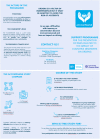An innovative therapeutic educational program to support older drivers with cognitive disorders: Description of a randomized controlled trial study protocol
- PMID: 35923824
- PMCID: PMC9339957
- DOI: 10.3389/fneur.2022.901100
An innovative therapeutic educational program to support older drivers with cognitive disorders: Description of a randomized controlled trial study protocol
Abstract
Older drivers face the prospect of having to adjust their driving habits because of health problems, which can include neurocognitive disorders. Self-awareness of driving difficulties and the interaction between individual with neurocognitive disorders and natural caregiver seem to be important levers for the implementation of adaptation strategies and for the subsequent voluntary cessation of driving when the cognitive disorders become too severe. This study aims to evaluate an educational program for patient/natural caregiver dyads who wish to implement self-regulation strategies in driving activity, and to improve self-awareness of driving ability. The ACCOMPAGNE program is based on seven group workshops, which target the dyad. The workshops deal with the impact of cognitive, sensory and iatrogenic disorders on driving. They tackle questions about responsibility, and about autonomy and social life. They also provide alternative solutions aimed at maintaining outward-looking activities even if driving is reduced or stopped. A randomized controlled trial is planned to evaluate the effectiveness of the program 2 months and 6 months after inclusion, and to compare this to the effectiveness of conventional approaches. The main outcome of this trial (i.e., the implementation of self-regulated driving strategies), will be measured based on scores on the "Current Self-Regulatory Practices" subscale of the Driver Perception and Practices Questionnaire. The Driving Habits Questionnaire will be used to measure secondary outcomes (indicators of driving changes; indicators of changes in mood, quality of life and caregiver burden; and self-awareness of driving abilities). Indicators will be collected for both patients and natural caregivers. This cognitive, social and psychological program should allow older individuals with cognitive disorders to drive more safely, and help to maintain the quality of life and mood of both patient and natural caregiver despite driving limitations. The patient's care path would be optimized, as he/she would become an actor in the process of giving up driving, which will, most certainly, be needed at some point in the progress of neurocognitive disorders. This process ranges from becoming aware of driving difficulties, to implementing self-regulation strategies, through to complete cessation of driving when necessary.
Clinical trial registration number: NCT04493957.
Keywords: caregiver; cognitive impairment; driving cessation; education; self-regulation.
Copyright © 2022 Delphin-Combe, Coste, Bachelet, Llorens, Gentil, Giroux, Paire-Ficout, Ranchet and Krolak-Salmon.
Figures
References
-
- Chee JN, Rapoport MJ, Molnar F, Herrmann N, O'Neill D, Marottoli R, et al. . Update on the risk of motor vehicle collision or driving impairment with dementia: a collaborative international systematic review and meta-analysis. Am J Geriatric Psychiatry. (2017) 25:1376-90. 10.1016/j.jagp.2017.05.007 - DOI - PubMed
Associated data
LinkOut - more resources
Full Text Sources
Medical



